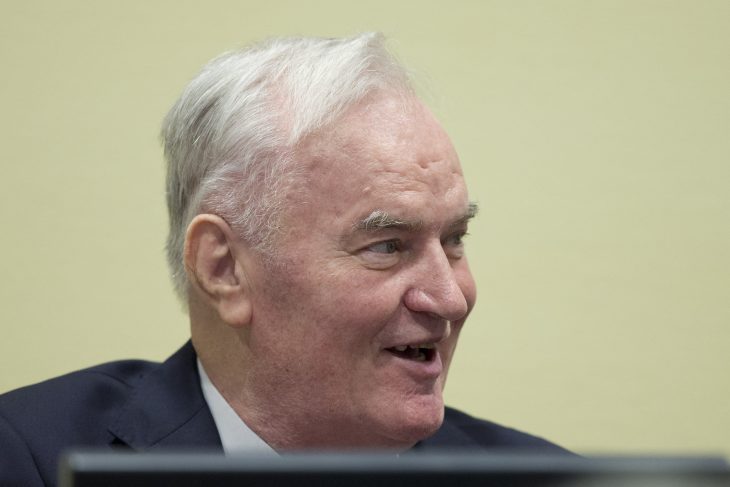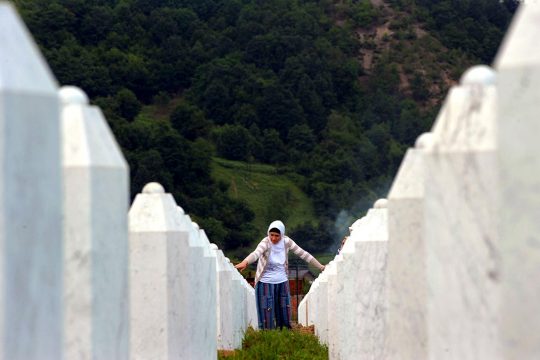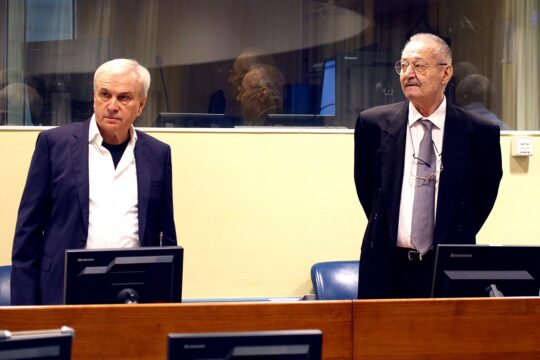It’s the end of a trial that many thought would never come. This Tuesday the International Residual Mechanism for Criminal Tribunals (IRMCT), a judicial body that has replaced the former UN tribunals for Rwanda and former Yugoslavia, will hand down the appeals judgement in the case against former Bosnian Serb general Ratko Mladic.
This judgement marks the end of the last trial of the real principals of the conflicts that tore apart the former Yugoslavia in the 1990s. (The only ‘Yugoslav’ case remaining at the MICT is the re-trial of two former Serbian spymasters.) Mladic was the head of the Bosnian Serb army during the Yugoslav wars of 1992-1995. He spent over 15 years on the run between 1995, when the UN court issued its first indictment against him, and 2011 when he was arrested at a cousin’s house in a Serbian village and handed over to the then International Criminal Tribunal for the former Yugoslavia (ICTY)..
600 witnesses and a 2,500 page judgement
Because he was one of the last fugitives the ICTY got its hands on, the case against Mladic was largely known through other trials. At the time of his conviction in 2017 there had been 90 other individuals convicted and sentenced by the ICTY. Many of those cases overlapped to some extent with the Mladic case in terms of the crime base they were looking at. While a lot of the evidence was already tested in court in those other cases, the size and scope of the case against Mladic made his trial go on for five and a half years. Nearly 600 witnesses testified and almost 10,000 documents were taken into evidence. The Trial Chamber took notice of some 2,000 adjudicated facts and its final judgement was around 2,500 pages. The appeals phase alone took another three and a half years.
The IRMCT prosecutor Serge Brammertz – who has been in charge of this case since 2008 when he became the ICTY Prosecutor – pointed out that even though the prosecution had reduced the indictment by 40 percent prior to the beginning of the trial, it remained “a huge case” where most of the evidence and witnesses had to be presented live in court. “There are many objective reasons why it has taken so long and if you look at other international tribunals you will see that you have cases that are, in terms of magnitude, 10 percent of our case and which have also taken ten years,” he told journalists last week.
In 2017 the judges found that Mladic, who was then 74, played a central role in four different “joint criminal enterprises” which essentially carried out "ethnic cleansing" campaigns against Bosnian Muslims and Bosnian Croats, as part of a plan to forge a "Greater Serbia" out of parts of the former Yugoslavia.
As the military leader of the Bosnian Serb forces he was convicted of genocide, war crimes and crimes against humanity, including terrorizing the civilian population of the Bosnian capital Sarajevo during a 43-month siege, and the killing of more than 8,000 Muslim men and boys at Srebrenica, Bosnia, in July 1995. He was sentenced to life in prison.
A “simple man”
Mladic appealed on several grounds, mainly attacking the findings about the existence of four joint criminal enterprises and his contribution to them. Defence lawyers also argued Mladic did not get a fair trial and said the judges did not take his failing mental health and advanced age properly into account. Mladic has suffered several strokes and a heart attack, but medical experts consulted by the court concluded the former general was fit to stand trial.
Last August, in a sometimes rambling personal statement at the end of the appeals hearing, Mladic cast himself as a professional soldier and a “simple man” who was thrown into war by a NATO alliance trying to break up the former Yugoslavia. "We do not deny that others engaged in crimes... but they do not have anything to do with Mr. Mladic," defence lawyer Dragan Ivetic told the appeals judges. Ivetic called for Mladic to be acquitted or face a retrial.
The prosecution has also appealed to ask the judges for a second genocide conviction for the campaign of ethnic cleansing in a number of municipalities in Bosnia at the start of the war. The campaign included setting up a series of detention camps where tens of thousands of Muslims and Croats were beaten, tortured, held in inhumane conditions and sometimes sexually assaulted. The prosecution has tried this in every case involving similar charges but so far the 1995 killings in Srebrenica remain the only recognized instance of genocide during the Yugoslav wars.
The suspense lies in a dissenting judge
The objections the defence raised might find more purchase with the appeals chamber’s presiding judge Prisca Nyambe. As tribunal watcher Iva Vukusic pointed out on Twitter, Nyambe wrote a dissenting opinion in the 2012 judgement of Zdravko Tolimir, one of Mladic’s direct subordinates in Srebrenica in 1995, where she questioned the basis for Tolimir’s conviction by the majority. General Tolimir was convicted of genocide, war crimes and crimes against humanity by an ICTY trial chamber and much of the evidence in the Tolimir and the Mladic case overlaps when it comes to the Srebrenica genocide. But in her dissenting opinion judge Nyambe said she believed most of the evidence against Tolimir was circumstantial and only derived from his position in the chain of command of the Bosnian Serb army. She stated that based on the evidence in the case she could not conclude there was forcible transfer of the Muslim populations of Srebrenica. She also did not agree with the majority finding that there was “a highly organised murder operation” after the fall of Srebrenica that was shared widely among the leadership of the Bosnian Serb army. Instead she suggested it could have arisen from a small group of individuals “operating in an unauthorised and secretive manner”.
Asked about the Tolimir judgement prosecutor Brammertz would not directly comment on the judges’ conclusions but stressed he was confident the appeals chamber would uphold Mladic’s conviction. “I am absolutely convinced that the evidence is overwhelming, and I very much trust that a large majority of judges will see it the same way,” he said. “If there is a dissenting opinion so be it, I have nothing against it, it just shows we are not an institution where one opinion is imposed on everyone,” he added while concluding that he “could not imagine any other outcome than a confirmation of the conviction”.







